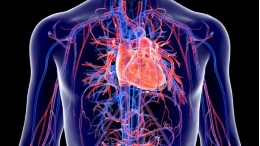
Call for Cardiovascular Scientists to Contribute Data to Multinational Platform
April 6, 2021 — The project euCanSHare, funded by the European Union and Canada, has launched the first international platform for sharing cardiovascular data. Implemented by seventeen partners and led by the University of Barcelona and the European Society of Cardiology (ESC), the project will enable researchers on cardiology to use the platform for data browsing, deposit and analysis.
The platform brings together information on more than one million individuals from thirty-five cardiovascular cohorts in the EU, Canada and beyond. It aims to accelerate research in personalised medicine for cardiovascular disease and to promote the responsible exchange of data while reducing cultural, behavioural and technological barriers to Open Science.
 Project coordinator Karim Lekadir, Ramon y Cajal postdoctoral researcher at the University of Barcelona, says that “euCanSHare is an unprecedented effort to create a long-awaited international data platform for more responsible sharing and more efficient exploitation of large-scale cardiovascular research studies across institutions. The platform will facilitate access to information on available cardiovascular datasets, while increasing trust through well-established and highly secure data management mechanisms.”
Project coordinator Karim Lekadir, Ramon y Cajal postdoctoral researcher at the University of Barcelona, says that “euCanSHare is an unprecedented effort to create a long-awaited international data platform for more responsible sharing and more efficient exploitation of large-scale cardiovascular research studies across institutions. The platform will facilitate access to information on available cardiovascular datasets, while increasing trust through well-established and highly secure data management mechanisms.”
“euCanSHare provides the privacy and governance mechanisms for the secondary use of data,” says Bartha Maria Knoppers, from McGill University (Canada), who together with Pascal Borry, from the Catholic University of Leuven (Belgium), leads the work package on ethics and interoperability.
The platform, which is hosted on the Barcelona Supercomputing Centre’s (BSC’s) cloud, holds metadata on social and demographic factors such as omics (DNA,RNA,proteins), as well as cardiac imaging, lifestyle behaviours, and clinical data including outcomes.
Cardiovascular diseases are the leading cause of death worldwide: ischaemic heart disease and stroke were responsible for the most deaths globally in 2019. The majority of heart attacks and strokes can be prevented with healthy lifestyles including physical activity and a nutritious diet, controlling body weight, and not smoking. Management is most effective when conditions are diagnosed early, and treatments are tailored to individual patients.
Personalised treatment relies on the discovery of individual biomarkers that identify who is at risk of cardiovascular disease and who will respond to a particular therapy. Research in this field requires integrating large amounts of cardiovascular data, including molecular, imaging and clinical data as well as lifestyle and demographic information from heterogeneous population and patient cohorts. This presents fundamental challenges for data storage, management and analysis, IT capacity, and accessibility. These are the challenges addressed by euCanSHare, the most comprehensive cardiovascular data catalogue ever assembled.
The euCanSHare platform covers the entire research path, from data access to distribution of results. Features include: 1) a cohort browser and catalogue enabling professionals to search for cohorts to use in their research; 2) a controlled access manager user interface for providing credentials and requesting permission to use selected information (which will go live next year); 3) a data manager tool for new data depositions; 4) a data analyser workspace for approved users; and 5) written instructions and a helpdesk to guide new users of the platform.
In particular, the catalogue provides a detailed description of available datasets, including key variables, access policies and harmonisation status across cohorts. In the current version, the catalogue provides information on 310,000 individuals from thirty studies.
euCanSHare Consortium
The following partners take part in the euCanSHare consortium:
1. Universitat de Barcelona, Spain (Project Coordinator)
2. Research Institute of the McGill University Health Centre (Canada)
3. Universitätsklinikum Hamburg-Eppendorf (Germany)
4. Lynkeus, (Italy)
5. University Erasmus Medical Center of Rotterdam (Netherlands)
6. Queen Mary University of London (United Kingdom)
7. Centre of Genomics and Policy, McGill University (Canada)
8. Catholic University of Leuven (Belgium)
9. Barcelona Supercomputing Center (Spain)
10. Center for Genomic Regulation (Spain)
11. European Society of Cardiology (France)
12. Biobanks and Biomolecular resources Research Infrastructure – European Research Infrastructure Consortium (BBMRI-ERIC), (Austria)
13. Population Health Research Institute, McMaster University, (Canada)
14. National Institute of Health and Wellbeing (Finland)
15. University Hospital Greifswald (Germany)
16. Nostrum Biodiscovery (Spain)
17. Pompeu Fabra University (Spain)
Click here to learn more.
Source: University of Barcelona






























